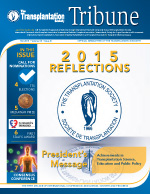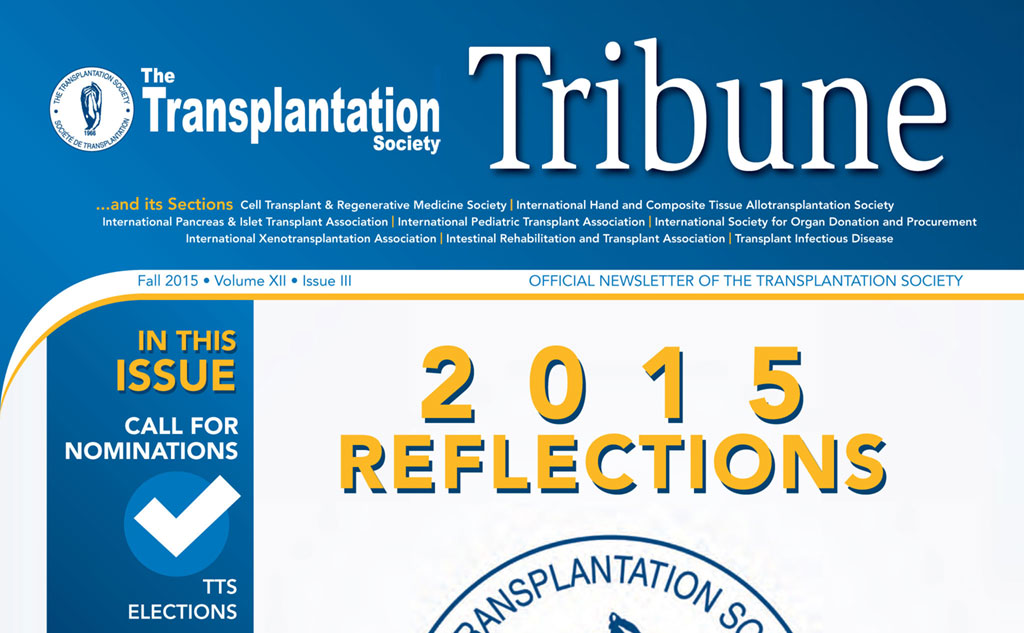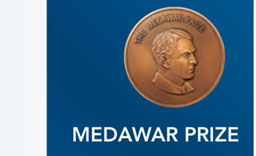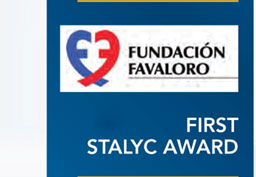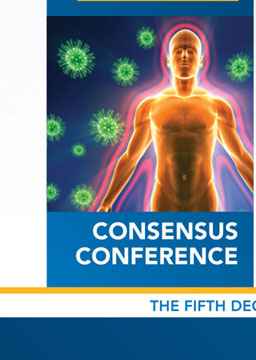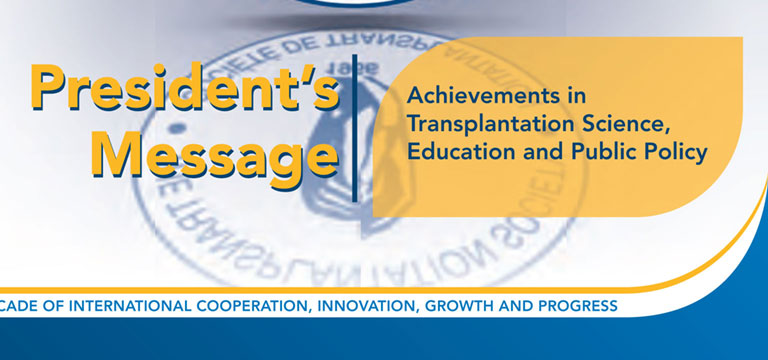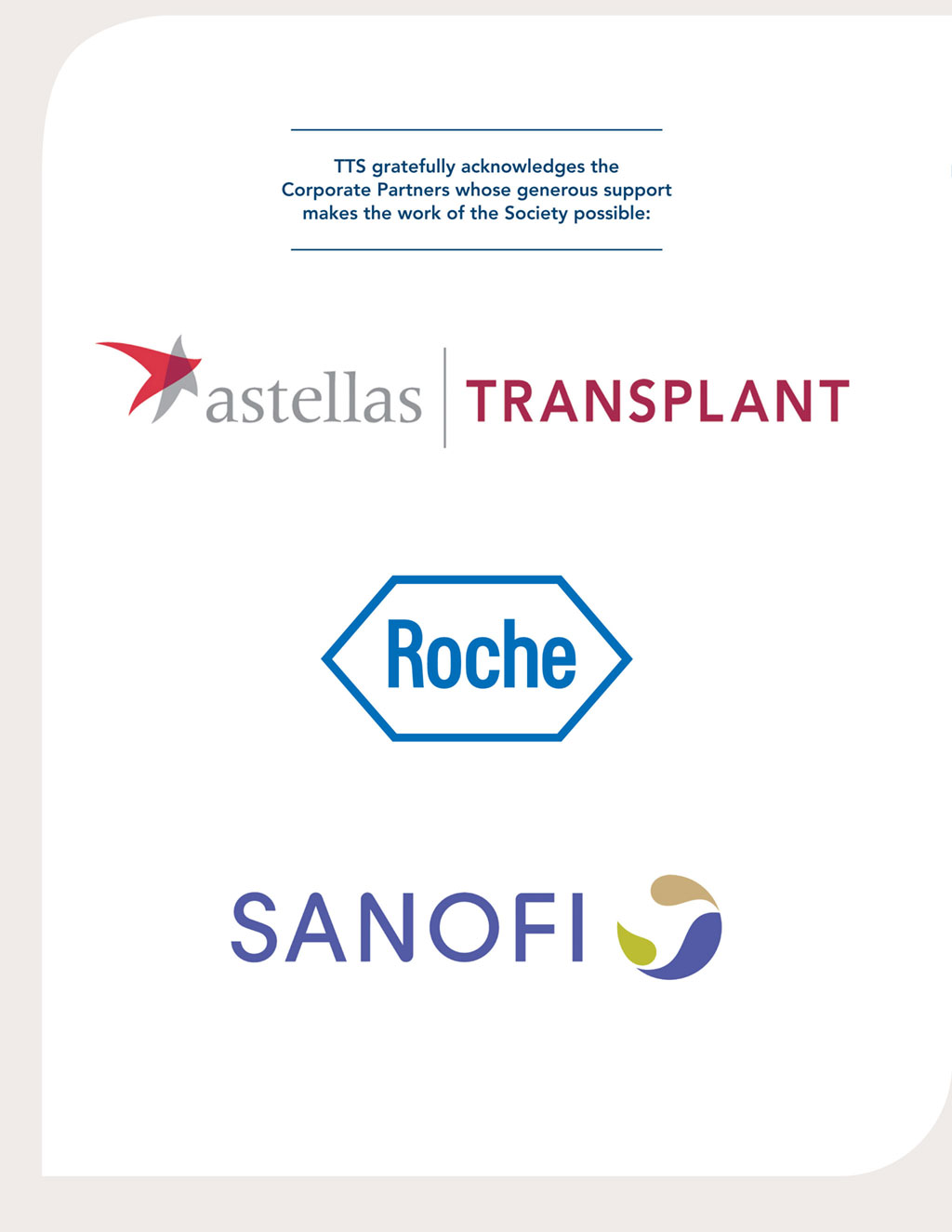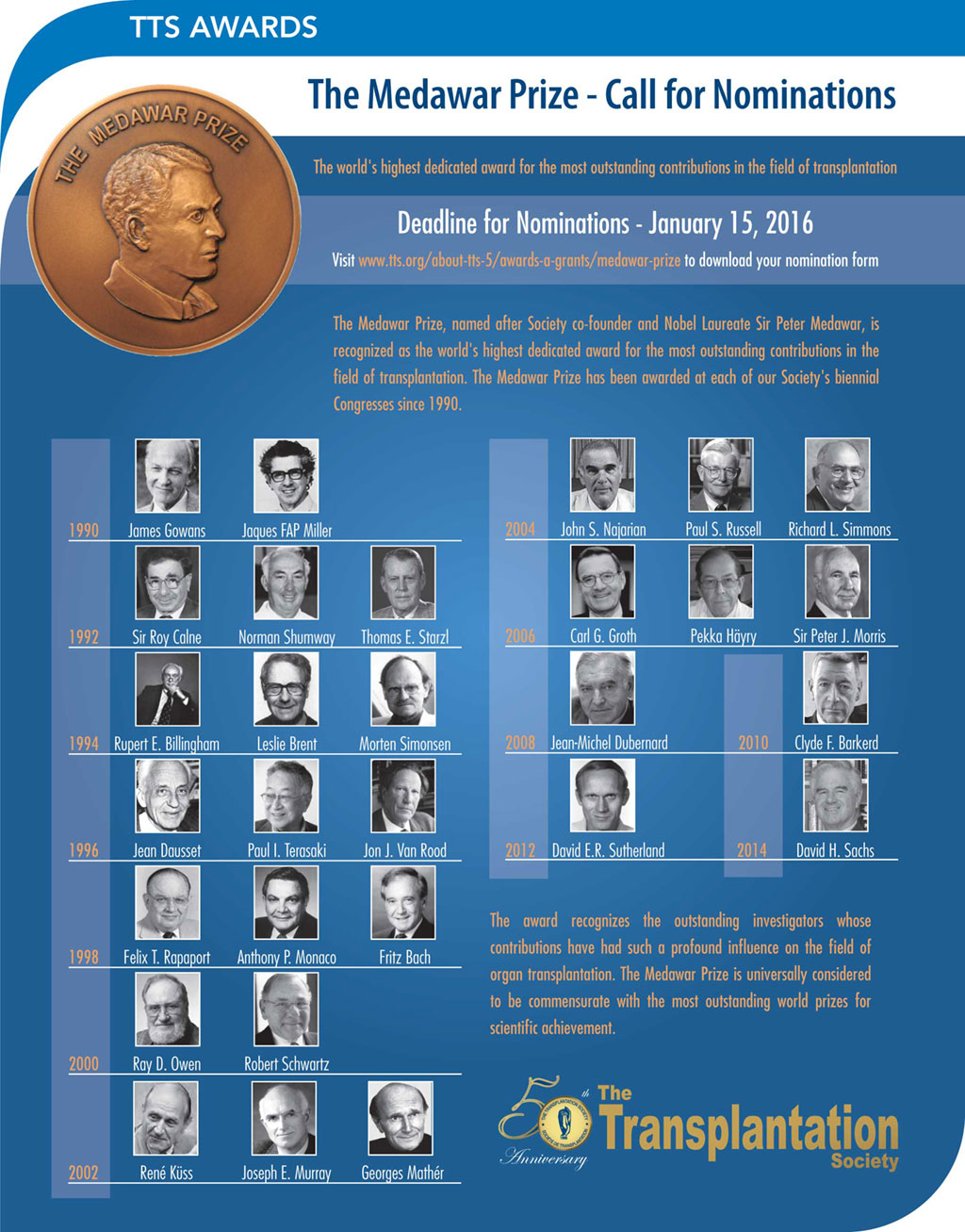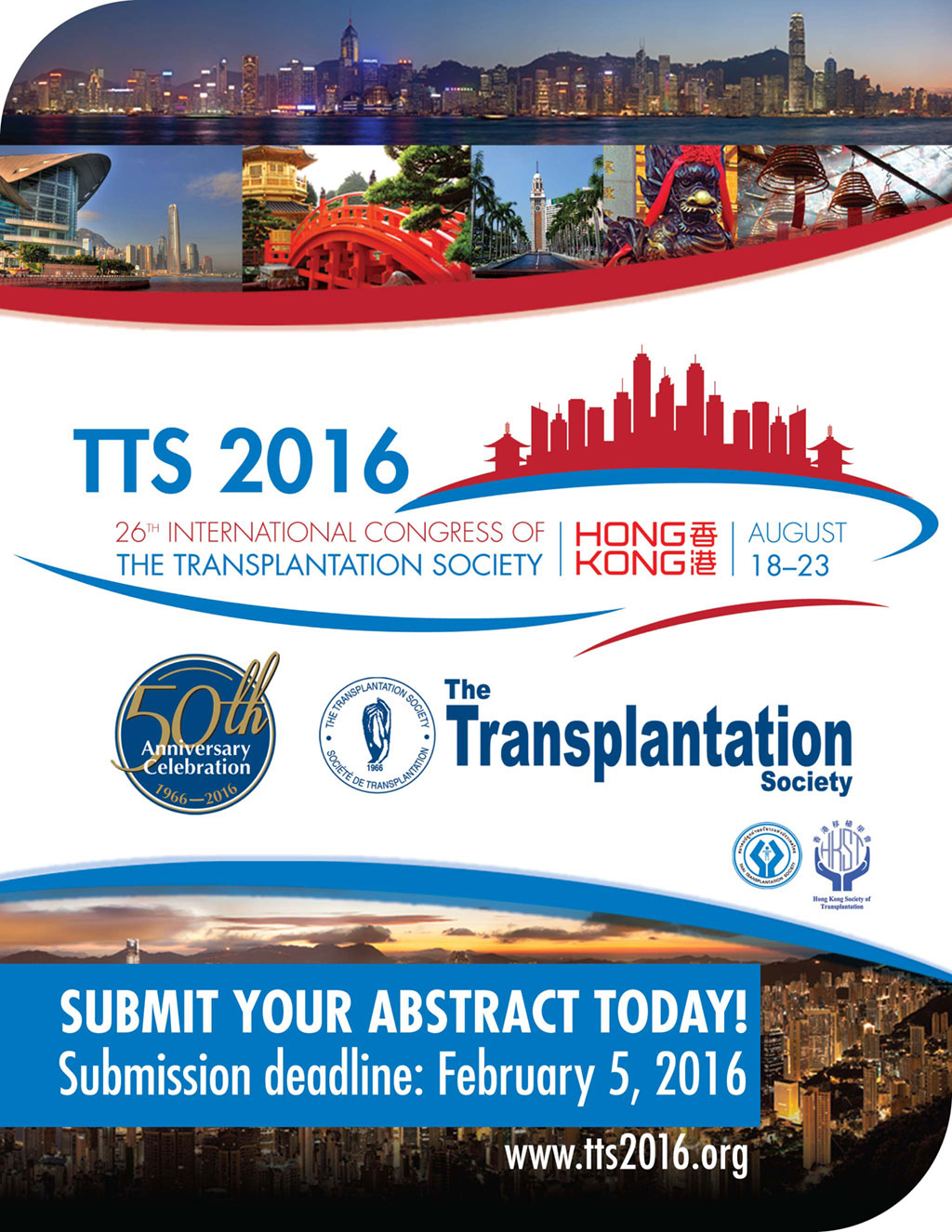Newsletter 2015 Volume 12 - Issue 3

Now that we are approaching the end of 2015, it is a good time to reflect on what has been achieved by our Society throughout the year. Many members have been busy co-ordinating our extensive list of events in Transplantation Science, Education and Public Policy.
Recently, the Society held its Transplantation Science Symposium (TSS) in Lorne, Australia. We partnered with several other Societies - an increasingly common practice – to deliver an outstanding program in an ideal setting for a retreat-style meeting such as the TSS. The ability to link up with several regional and national societies such as the Transplantation Society of Australia and New Zealand, the Asian Society of Transplantation, the Middle East Society for Organ Transplantation, the International Liver Transplantation Society, the American Society for Reconstructive Transplantation and the European Society for Organ Transplantation allowed our Science Committee to recruit an impressive international faculty to deliver state of the art lectures on all facets of transplantation. The meeting was well attended with registrants coming from all regions of the globe. Mentee-Mentor teams were sponsored by the Canadian Society of Transplantation, Deutschen Transplantations-gesellschaft, European Society for Organ Transplantation, the Japanese Society of Transplantation, the Transplantation Society of Australia and New Zealand and The Transplantation Society
I strongly believe that it is essential for our Society to produce high quality scientific meetings such as the TSS. More so than in many other medical specialties, it is essential for clinicians to understand the science that is the bedrock of our clinical practice. Equally, the relationship between scientists, researchers and clinicians is closer than in most other specialties and we must all speak the same scientific language if clinical outcomes for patients are to improve. Hence, TTS must remain a professional organization founded in science. Disseminating that knowledge to our members through meetings such as the TSS is one of the Society’s main objectives. The success of the Lorne meeting was due to the hard work of many people within the organization. In particular I would like to congratulate the program organisers: Shane Grey, Stephen Alexander and members of the Science Committee for their hard work and vision.
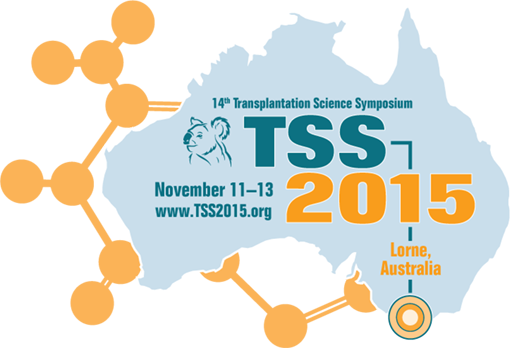

In addition to the TSS, all Sections of the Society have their biennial scientific meetings in various locations. In the years where the TTS does not hold its Congress, members with a specific interest in particular and specialized aspects of transplantation such as cell transplantation, pediatric transplantation, pancreas transplantation, vascularized composite allotransplantation, intestinal transplantation or xenotransplantation hold smaller, more interactive meetings devoted to these sub-specialty. What is encouraging is that these specialty meetings are becoming more popular with larger attendance. I see this as a sign of a healthy and responsive Society that is capable of catering to the broad interests of members and I wish to thank the many members who have worked to make these meetings such a success.
More so than in many other medical specialties, it is essential for clinicians to understand the science that is the bedrock of our clinical practice
There has been a quiet revolution in the way we provide educational resources to our members
Hand in hand with the Society’s efforts to promote transplantation science, there has been a quiet revolution in the way we provide educational resources to our members. In particular the Education Committee, led by Marcelo Cantarovich and Vivek Jha, have been busy reorganizing our substantial educational material so that it is more accessible to the membership. They are also taking on the ambitious task of developing a transplant educational course that will provide a comprehensive and systematic overview of transplantation. I am confident that the committee will be able to give an overview of this exciting development in the near future.
|
Another area where the Society remains very active is in public policy. The Society has just renewed its relationship as an NGO in official relations with the WHO. There are a number of joint initiatives that the Society hopes to pursue over the next 3 years – especially with the dissemination of the ethical principles for procurement of medical products of human origin. |

Also, as one of the sponsoring societies of the Declaration of Istanbul Custodian Group (DICG) we remain steadfast in our opposition to organ trafficking, transplant tourism and the use of organs from executed prisoners. If transplantation is to reach is potential as a treatment for end-organ failure, we must ensure that all aspects of organ donation and transplantation are founded on sound and defensible ethical principles. Otherwise the public and the people we are trying to treat will loose faith in the system. Over the past several decades, TTS has been vocal and forthright in this area and remains at the forefront of these endeavors. I wish to pay tribute to the many members who have worked tirelessly in this area in all regions of the globe.
As well as promoting the ethical standards for organ donation and transplantation, our members have been busy promoting transplantation in regions where it is underdeveloped or non-existent. Throughout the year I have had the privilege to visit several of these regions, including central Asia and Mongolia, to meet with colleagues working in these areas and to learn of the challenges of bringing transplantation to these regions. In addition, many of our colleagues with busy clinical practices in successful transplant centres are working hard, and giving up their holidays and free time, to assist countries such as Myanmar and Vietnam to establish transplant centres that in time will become self-sufficient and provide transplant services to their citizens. There are countless other examples of this that are too numerous to mention in many regions including Latin America, Middle East and Africa. In order to provide practical assistance to these efforts, TTS has partnered with the ISN to provide a modest level of financial assistance to promote relationships between an established centre in the developed world and a new centre in the developing world. This assistance is provided through the Sister Transplant Center Program, and I would encourage members who have such a relationship to apply for this funding.
As a final point I would like to thank you all for your support and friendship throughout the year. In particular, I would like to thank the Executive and Council that have worked very hard to ensure that we have been able to deliver our ambitious program. It is a great privilege to lead a Society such as this. A special thank you must go to our staff at the International Headquarters in Montreal. As always, they have been professional in their work and are an important component of our success. Without their support, our mission and objectives would remain unfulfilled.
As we approach the festive season I would like to wish you all a peaceful and safe time with your families and friends and I look forward to meeting as many of you as I can in the coming year.

Nominations for Officer and Council Positions deadline is January 15, 2016.
SUBMIT YOUR NOMINATIONS AT www.tts.org/nominationsIn 2016, three Officer positions will be vacated and 6 of the 12 councilors-at-large representing the regions will be changing. The elections will take place early in 2016 and those elected will assume their new roles following the 2016 TTS Congress in Hong Kong.
Nominations are being sought for these positions. Members can access the online nominating form at www.tts.org/nominations. Since each nominee must have his or her form signed by three supporting members (including him/herself), the online process allows for efficient and rapid circulation.
The nomination deadline is January 15, 2016
Please note:
- As successive presidents may not be from the same region, members from the North American region who would have otherwise been eligible to become President-Elect are not eligible in these elections.
- Only members who have served a full term on Council are eligible for the Officer positions (President-Elect, Secretary and Treasurer).
- Only full members who have paid their dues may be nominated to Council, or nominate and/or vote.
For more information on elections, visit the TTS website and consult the by-laws in the “About” section.
Nominations are being sought for the following officer and councilor positions:
Officer Positions:
- President-Elect
- Secretary
- Treasurer
Councillor Positions:
- Asia (2)
- Europe (1)
- Latin America (1)
- North America (2)




The Small Bowel Transplant Team at the Favaloro Foundation received the First Award in Clinical Investigation, which was given out at the Latin American and the Caribbean Transplant Congress (STALYC), held in Cancun, Mexico, from October 13-17.
Dr. Héctor Solar presented the Award during the opening session of the congress. The rewarded work shows the results of 9 years of the Small Bowel Transplant program at the Favaloro Foundation, which has the best registry and results in the region. The authors were Gabriel Gondolesi, Héctor Solar, Diego Ramisch, Carolina Rumbo, Constanza Echevarría, Fabio Nachman, Luis Moulin, Silvia Niveyro, Adriana Crivelli, María Inés Martínez, Lila Chavez, María de los Angeles Páez, Francisco Klein, Julio Trentadue and Adriana Fernández.
Dr. Gondolesi did a master conference entitled “State of the Art in Small Bowell Transplant and Multivisceral” during the same congress and doctors Héctor Solar, Carolina Rumbo, and Adriana Fernández carried out dissertations and participated in a round table with representatives of other countries on the same topic.
These awards continue to establish further the Favaloro Foundation University Hospital as a leader in transplantation in the region. Congratulations to Dr. Gondolesi and everyone on the team!
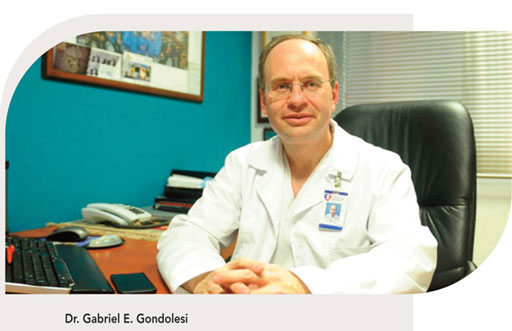
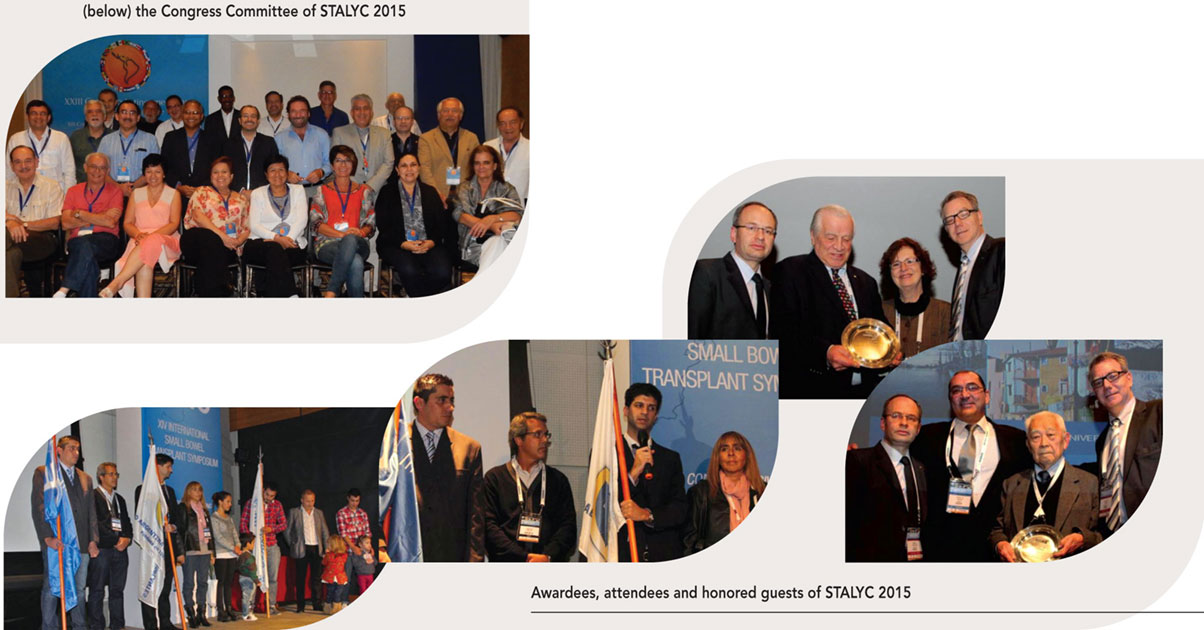
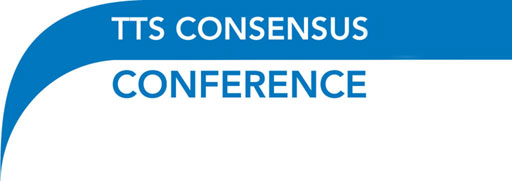
In September this year, The Transplantation Society held a Consensus Conference in Arlington, Virginia, with the aim of stimulating renewed interest in clinical trials of immunosuppression. The Society brought together 28 experts from around the globe to identify the current roadblocks to approval of new immunosuppressive agents in transplantation and to identify a path forward.
Currently, trials of immunosuppression in transplantation are in the decline because the objectives of current clinical trials are focused on improving acute rejection rates and graft survival in the first 12 months. With a 1-year renal graft survival rates of >90% for standard care patients, the best that can be hoped for is non-inferiority compared to current standard of care. This is financially unviable for companies trying to bring new agents into the field. Moreover, trials for difficult clinical care issues or high-risk patients are not being undertaken. Furthermore, current trial design is not leading to improvements in long-term outcomes and safety, and hence important needs in transplantation are not being met.
Whilst current immunosuppressive protocols are providing good outcomes for many patients and the costs of immunosuppression are falling, there are many patients who have unmet clinical needs and who develop intolerable and life threatening side effects as the result of the current treatment protocols. Clearly, there are many situations where therapy could be improved in order to achieve better outcomes for our patients. At this time where there are many opportunities to use sophisticated patient profiling technologies, and with the advent of new, more specific and more effective immunosuppressive agents, there is the tantilising prospect of tailoring personalized immunosuppression for our patients. In this respect, there is much we can lean from our colleagues in infectious disease and oncology.
With this in mind, a working group consisting of Randall Morris, Rosalyn Mannon, Dirk Kuypers and myself developed a program with the aim of producing a consensus document to substantially realign the priorities of clinical trials of transplant immunosuppression with the current clinical problems and priorities. To achieve this, it was agreed that we need to redesign clinical trials of transplant immunosuppression in order to provide data that will identify superior treatment options for patient subgroups and allow new agents to be evaluated for efficacy and safety and achieve regulatory approval for transplantation.
The meeting was held in conjunction with an FDA workshop on surrogate endpoints in clinical trials in transplantation where several TTS members who are experts in the field spoke. The FDA workshop was an excellent backdrop to the TTS Consensus Conference as it allowed us to understand what was required to achieve regulatory approval under the recently introduced Food and Drug Administration Safety and Innovation Act of 2012 where there is an opportunity for enhanced expedited pathways for drug approval, including breakthrough therapy designation, based on surrogate end-points that have been shown to be predictive of hard end points such as patient death and graft loss.
Realising that there is a new opportunity to rethink how we approach trials of immunosuppression, the members of the TTS consensus group set to the task of defining patient subgroups, such as those at high risk of immunological graft loss, proposing biomarkers that may define patient groups, and identifying surrogate end points predictive of graft loss 5 to 7 years after transplant. Whilst the detailed outcomes of the conference will be summarized in an opinion piece that will be submitted for publication in the near future, it can be said that much progress was made identifying gaps in our knowledge and proposing new trials for specific subgroups of patients. In terms of maintenance immunosuppression, whilst a number of agents are currently available, there remain significant shortfalls in efficacy and safety for calcineurin inhibitors (due to nephrotoxicity, side effects and rejection risk), antiproliferative agents (azathioprine, mycophenolate preparations), and mTOR inhibitors due to incomplete efficacy and side effects.
Antibody mediated rejection (AMR) was identified as an area of unmet medical need, as no approved drugs exist for either prevention or therapy. Considerable discussion was held regarding clinical phenotypes induced by donor-specific antibodies, including clinically silent AMR. Similarly, no approved drugs or regimens exist for desensitization (defined as reduction or elimination of preformed HLA antibodies) at present. The role of antibody in chronic renal allograft injury was identified as an area where currently applied therapies remain poorly studied, and the clinical condition is poorly defined. It was also felt that the pathogenesis of chronic graft loss in renal transplantation was not well understood and should be a focus area of further research if we are to develop new therapies to treat this difficult condition.
Clearly, there are many situations where therapy could be improved in order to achieve better outcomes for our patients
The conference did propose new ways to design clinical trials that will be able to identify superior treatments using realistic numbers of participants. Issues that the group felt needed to be addressed included but were not limited to:
- Better 5- and 10-year graft outcomes
- Better treatments for highly sensitized patients
- Better treatments for patients with immunological high risk
- immunosuppressive combinations that are better tolerated by patients with less side effects
- less morbidity and mortality as a result of long term immunosuppression especially cancer risk
What was clear was that, as a community, we need to be more proactive in developing collaborative clinical trial groups. It is our responsibility to be a voice for our patients and identify the unmet clinical needs that should be addressed. We also need to develop clinical trials in areas where patient outcomes are poor such as in highly sensitized patients. This cannot be left to someone else. It is important that we identify the priorities for new treatments and communicate these to both regulators and industry. This has to be done with a more unified voice if we are to achieve real change. All who attended the Consensus Conference were encouraged by the spirit of co-operation, which we hope will be communicated to the broader community.
The outcomes of this meeting will be submitted for publication soon and will be discussed at a special session at the annual scientific meeting in Hong Kong in 2016. I look forward to seeing you there as we move this initiative forward.
Philip J. O’Connell
President
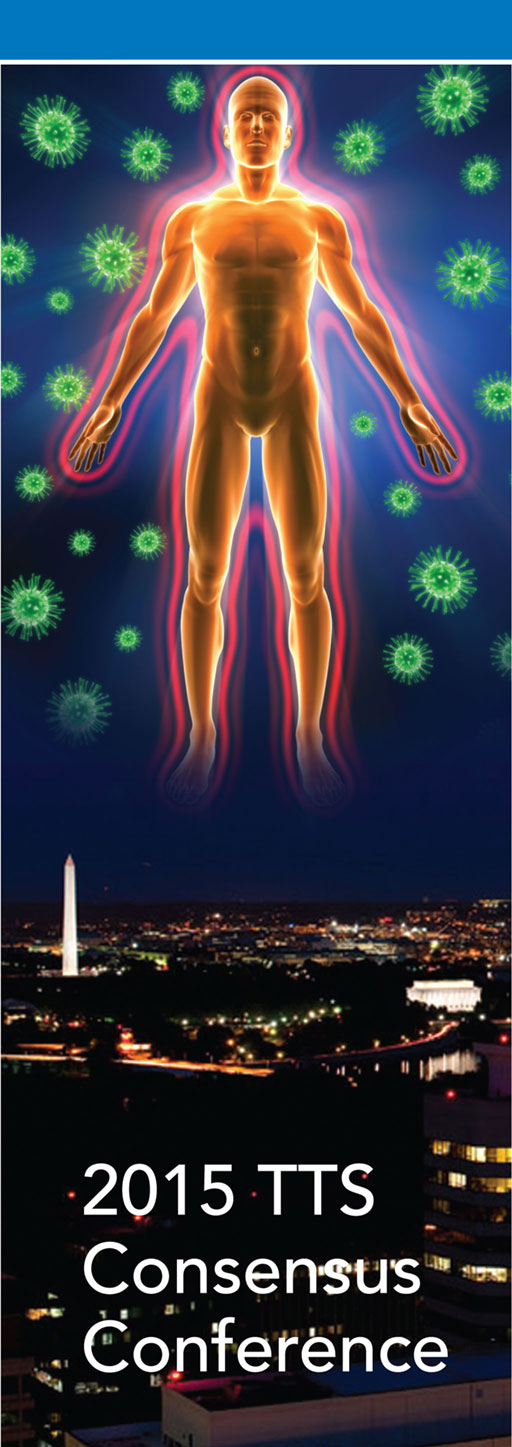
To consolidate its position as the leading global organization, the Council has representation from all six regions of the world: Asia, Europe, Latin America, Middle East/Africa, North America and Oceania.
EXECUTIVE MEMBERS
| PRESIDENT Philip J. O’Connell |
| PRESIDENT-ELECT Nancy Ascher |
| IMMEDIATE PAST PRESIDENT Francis L. Delmonico |
| VICE-PRESIDENT Marcelo Cantarovich |
| SECRETARY Gabriel Danovitch |
| SENIOR TREASURER John J. Fung |
| TREASURER Elmi Muller |
| HISTORIAN Randall E. Morris |
| INTERNATIONAL HEADQUARTERS Jean-Pierre Mongeau Executive Director |
COUNCILORS
| ASIA Jongwon Ha Vivekanand Jha Shiro Takahara |
| EUROPE Beatriz Domínguez-Gil Dirk R.J. Kuyper |
| LATIN AMERICA Rudolf Garcia-Gallont Alejandro Niño Murcia |
| MIDDLE EAST / AFRICA Ifeoma Ulasi |
| NORTH AMERICA Minnie Sarwal Megan Sykes Stefan G. Tullius |
| OCEANIA Josette Eris |
Tribune is published three times per year by The Transplantation Society (TTS).
Editor-in-Chief: Nancy K. Man
International Headquarters
International Headquarters
The Transplantation Society
505 boul. René-Lévesque Ouest
Suite 1401
Montreal, QC H2Z 1Y7 CANAD
T. +1.514.874.1717
F. +1.514.874.1716
E. info@tts.org
W. www.tts.org
Please contact any of our dedicated staff for any assistance you may require:
| Roman Beliaevski IT/Multimedia roman.beliaevski@tts.org |
| Roberto Colarusso Director of Technologies robert.colarusso@tts.org |
| Geneviève Leclerc Director of Meetings genevieve.leclerc@tts.org |
| Frank Líndo Verissimo Meetings & Exhibits Coordinator frank.lindoverissimo@tts.org |
| Sondra Livingston Sections Manager sondra.livingston@tts.org |
| Amanda Mayer Membership Services Coordinator amanda.mayer@tts.org |
| Jean-Pierre Mongeau Executive Director jp.mongeau@tts.org |
| Catherin Parker Meetings Manager catherin.parker@tts.org |
| Chelsea Patriquin Meetings Coordinator chelsea.patriquin@tts.org |
| Denise Rainville Controller denise.rainville@tts.org |
| Anaïs Rodriguez Meetings Manager anais.rodriguez@tts.org |
| Eugenia Siu Registration & Administration Coordinator eugenia.siu@tts.org |
| Darren Woodbury Graphic Designer darren.woodbury@tts.org |
| Chi Hong Yeung Accounting Clerk chihong.yeung@tts.org |
Contact
Address
The Transplantation Society
International Headquarters
740 Notre-Dame Ouest
Suite 1245
Montréal, QC, H3C 3X6
Canada
Используйте Вавада казино для игры с бонусом — активируйте промокод и начните выигрывать уже сегодня!

